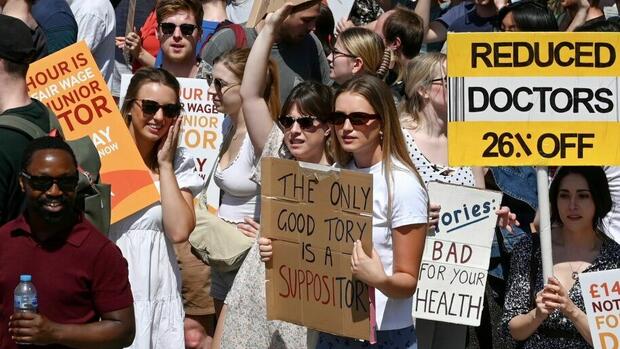Many young doctors took to the streets for more pay.
(Photo: Bloomberg)
London The UK government has increased its wage offer for public sector workers in a bid to end months of mass strikes across the island. Prime Minister Rishi Sunak announced on Thursday that the wages and salaries of millions of public workers are expected to rise by an average of 6.5 percent in fiscal 2023-24.
He thus accepted the proposal of the independent Wage Setting Commission, which is made up of business experts. Originally, the government only wanted to offer an increase of 3.5 percent.
“Today’s offer is final,” Sunak told a press conference at 10 Downing Street. “There will be no further talks on wages. No strike, no matter how large, will change this decision.” The additional state spending would not be financed by new debts or higher taxes. The ministries are now called upon to create the financial leeway for the wage increases through savings elsewhere.
Sunak’s offer has had its first success: the teachers’ union wants to submit the government’s offer to its members for a vote. If there is a majority in favor of it, the strikes planned for the autumn in many English schools would be off the table.
Wage increases cannot offset inflation
However, the head of government was unable to prevent the strike by the residents, who stopped work for five days on Thursday. It is the longest-ever strike in the UK healthcare system.
The ministries should save elsewhere for the higher wages.
(Photo: AP)
According to the doctors’ union, physicians have suffered real wage losses of almost a third in recent years. With a wage demand of 35 percent, they now want to close this gap. Health Secretary Steve Barclay has dismissed this as totally unacceptable.
Even the wage increases of between five and seven percent that have now been announced cannot rule out future real wage losses given an inflation rate of 8.7 percent most recently. Further strikes by the railway workers have therefore already been announced for mid-July.
The government rejects inflation compensation because it increases the risk of a wage-price spiral. The head of the central bank, Andrew Bailey, called on employees and companies to exercise restraint on wages and prices this week.
More: The British health system is in chaos – a cautionary tale for Germany
